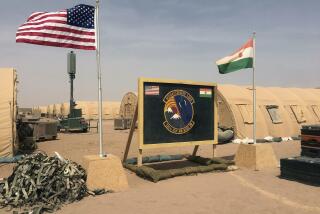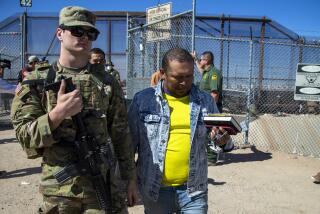Yugoslavia to Withdraw Troops From Slovenia
- Share via
ZAGREB, Croatia — The Yugoslav People’s Army will immediately begin withdrawing its 20,000 troops from Slovenia, it was announced Thursday in a move that suggests federal acceptance of independence for the republic.
The decision by the federal presidency meeting in Belgrade was announced by the Serbian delegate, Borisav Jovic, on Belgrade Television.
Jovic indicated that the army will move out of Slovenia within three months, coinciding with the timetable for independence implied by a European Community-brokered truce worked out on July 7.
“This is in complete accordance with our political stand that the Yugoslav army should not be stationed in those parts of the country which see it as an occupier,” Jovic said after the Belgrade meeting.
Serbia’s Communist strongman, President Slobodan Milosevic, gave the green light to Slovenia’s secession two weeks ago when he indicated that Serbian militia units would not take part in any armed action to keep the republic within Yugoslavia after it, along with Croatia, declared independence on June 25.
While the military retreat from Slovenia would represent a major victory for the alpine republic intent on breaking with the 73-year-old Balkan federation, it is expected to intensify the broader conflict between Serbia and Croatia, which threatens outright civil war.
The federal troops--part of the Zagreb-based 5th Army District--would likely relocate to Croatia once they leave Slovenia.
Tens of thousands of federal troops are already deployed in Croatia, ostensibly to separate Croatian police and national guardsmen from armed Serbian rebels fighting to prevent Croatian secession.
However, Croatian authorities in Zagreb accuse the federal soldiers of intervening to aid Serbian militants and have called upon the army to leave the republic.
The arrival of a huge contingent of soldiers from Slovenia would only worsen relations between Croatia and the Serbian-dominated federal army.
Serbia, the largest of Yugoslavia’s six republics and the guiding force of the military high command, opposes independence for Croatia, which declared its sovereignty on the same day as Slovenia.
About 11% of Croatia’s 5 million residents are Serbs, and many of them have vowed to use any means necessary to resist separation from the federation that binds them with Serbia.
At least 100 people have been killed in ethnic violence in Croatia so far this year.
Another 64 died in Slovenia last month after the army attempted to retake border crossings and airports from the secessionist republic after its declaration of independence.
Special correspondent Michael Montgomery, in Belgrade, contributed to this story.
More to Read
Sign up for Essential California
The most important California stories and recommendations in your inbox every morning.
You may occasionally receive promotional content from the Los Angeles Times.











